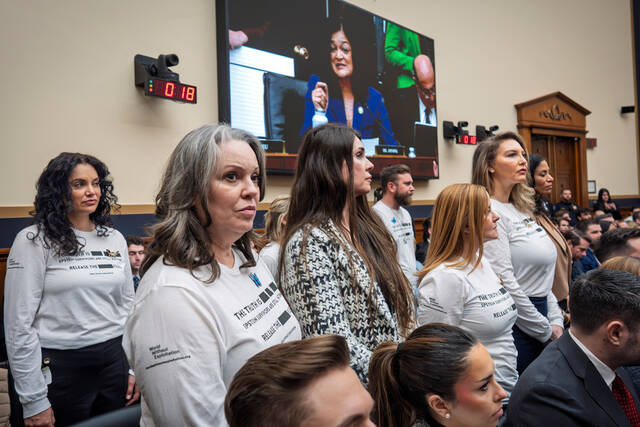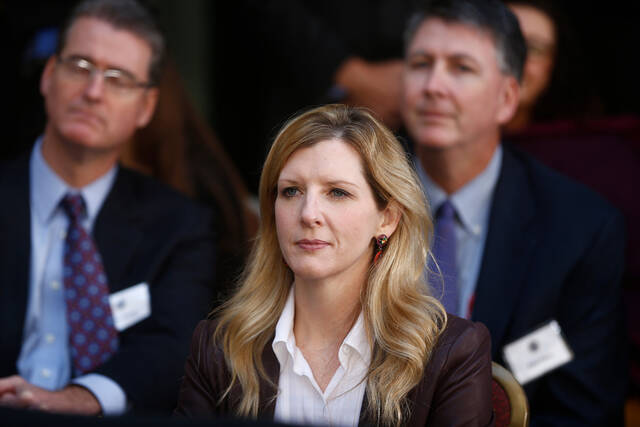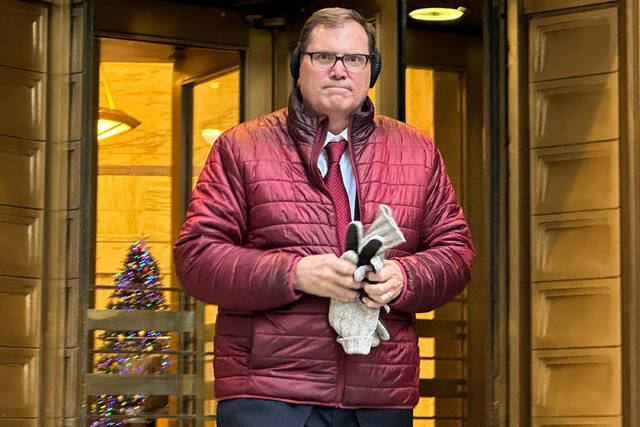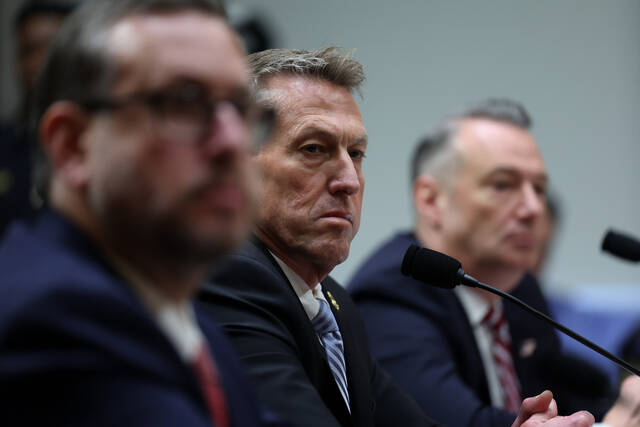U. S. Labor Secretary Eugene Scalia, son of the late Supreme Court Justice Antonin Scalia, said that among lessons he learned from his dad was that a justice’s job is not to play politics, nor base legal rulings on personal views.
“Judges aren’t qualified to do that. They are qualified to read the law carefully and base their decisions on the law,” Scalia, 57, told the Tribune-Review during an interview in the Federal Building in Downtown Pittsburgh. “That’s what my father emphasized, and that’s what Judge (Amy Coney) Barrett has emphasized that she would like to do.”
As the Trump administration moves to confirm Barrett as the next Supreme Court justice, Scalia stressed that the nation’s highest court should not be reduced to a political arena, nor its members perceived as political pawns.
“In terms of the role of the justice, I think it’s very important for people to understand what my father stood for — which is also what Judge Amy Coney Barrett has said that she stands for — which is judges looking at the text of the law, the text of the Constitution and the Constitution’s meaning in determining what the outcome in a case should be,” said Scalia, whose prior positions include private labor law attorney, solicitor of the Labor Department in the George W. Bush administration and special assistant to Attorney General William Barr (when he served under President George H.W. Bush), “rather than bringing their own preconceptions, their own ideas about social policy and the like.”
Barrett: ‘Judges can’t … impose their will on the world’
The labor secretary’s comments resembled remarks made by Barrett when questioned in Senate confirmation hearings, during which she said that she’d keep an open mind and would not “infuse my own policy views into it.”
“Judges can’t just wake up one day and say, ‘I have an agenda. I like guns. I hate guns. I like abortion. I hate abortion.’ And walk in like a royal queen and impose their will on the world,” Barrett said Tuesday, the second day of hearings. “You have to wait for cases and controversies, which is the language of the Constitution, to wind their way through the process.”
That process begins with the court accepting a case, then spans “briefs, oral argument, conversations with law clerks and chambers, consultation with colleagues, writing an opinion, really digging down into it,” Barrett said.
“It’s not just a vote. You all do that. You all have a policy and you cast a vote,” Barrett told senators. “The judicial process is different.”
Barrett rebuffed rhetoric and lines of questioning attempting to gauge how she might vote on critical cases based on personal preferences and beliefs, such as her status as a gun owner and her Catholic faith.
California Sen. Kamala Harris, the Democratic vice presidential nominee, argued that Barrett “poses a threat to safe and legal abortion in our country,” while South Carolina Republican Sen. Lindsey Graham lauded the nomination of “a woman who’s unashamedly pro-life and embraces her faith without apology.” Democratic Sen. Dick Durbin of Illinois spoke of Barrett as a win for Trump’s quest of overturning the Affordable Care Act.
“People say that you’re a female Scalia. What would you say?” Senate Judiciary Committee Chairman Lindsey Graham asked Barrett, a judge on 7th U.S. Circuit Court of Appeals and a law professor at Notre Dame since 2002.
Barrett said she considered Scalia, who garnered a reputation as being among the most conservative on the high court, as a mentor and that his approach to the law — “originalism and texturalism” — is hers as well. She clerked for Scalia in 1998 and 1999. She said they share the philosophy that the Constitution has “the meaning that it had at the time people ratified it.”
“But I want to be careful to say that if I’m confirmed, you would not be getting Justice Scalia, you would be getting Justice Barrett, and that’s so because originalists don’t always agree, and neither do textualists,” she told Graham. “It’s not a mechanical exercise.”
Justice Scalia’s friendship with Ruth Bader Ginsburg
Eugene Scalia got a unique perspective on the justice system and its leaders growing up the son of Antonin Scalia, a conservative bedrock on the high court for 30 years, from 1986 until his death in 2016. He got a front-row seat to the longtime friendship between his dad and Justice Ruth Bader Ginsburg, whose Sept. 18 death prompted President Trump to appoint Barrett weeks away from the presidential election.
Though they took different constitutional approaches, Justice Scalia and Justice Ginsburg valued an open exchange of ideas.
Eugene Scalia recalls New Year’s Eve dinners that lasted until 1 a.m. and began with champagne and opera music and involved Ginsburg, her father and their spouses discussing everything from the court to a sauce for wild boar.
“Now, Justice Ginsburg and my father did disagree about a lot of things,” Eugene Scalia said. “But they were wonderful friends. They had a lot of the same interests. They had the same job. They worked in the same building. They both loved music.
“But the other thing they enjoyed doing was just discussing their differences,” he said. “I think that’s something that our society is not as good at these days. There are some people that want to shut down the expression of the views they disagree with rather than hearing them out.”
The labor secretary noted that Ginsburg “made her mark as a pioneering advocate for women’s rights” while his dad “came to prominence as a critic of activist courts,” and that he respected what Ginsburg had achieved and knew he could learn from her.
“If there’s one thing to be taken from my father’s friendship together with Justice Ginsburg, it’s that those two people — who I think are heroes to different sets of Americans — they agreed on one very important thing: Let’s hear each other out. Let’s debate,” Eugene Scalia said. “And if it doesn’t bring about agreement, and often it didn’t, I think they both found it sharpened their ideas.”











